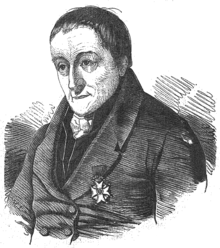Jens Christian Berg
Jens Christian Berg (born September 23, 1775 in Copenhagen , † June 4, 1852 in Christiania ) was a Norwegian lawyer and historian .
family
His parents were the director of the Royal lottery in Copenhagen, later pen clerk in Trondheim Niels Jensen Berg (1738-1798) and his wife Marie Margrethe Flor (1744-1817). His first marriage was on June 15, 1803, Hedevig Marie Elisabeth Wessel († April 18, 1816), daughter of the prime lieutenant and later major Joachim Wessel (1739-1791) and his wife Susanna Maria Vagel (1748-1820). In his second marriage on November 25, 1817, he married Juliane Marie Haxthausen (1784-1847), daughter of General Frederik von Haxthausen (1750-1825) and his wife Catharina von Oldenburg (1765-1843). The marriage was divorced in 1825.
Youth and Career
Jens Christian Berg was a lawyer, but he is best known as a historian. He tried to present Norwegian history from a Norwegian point of view, throwing a negative light on the time of the union with Denmark.
He spent his youth in Trondheim , but then grew up in Christiania and began his studies in Copenhagen in 1792. He was employed at "Det Kongelige Bibliotek", but returned to Norway without a university degree when his father died. He tried to get a teaching position at the cathedral school, but had to give way to Georg Sverdrup after a year . In 1800 he began to study law and lived as an assistant in the rent chamber. Through his uncle, the former administrator in County Jarlsberg , he got a job as Sorenbirkeskriver in Søndre Jarlsberg. After a short time he passed the law exam in Copenhagen, married and settled in Gulli in Sem (today Andebu Commune ).
He was a supporter of Hermann Wedel-Jarlsberg's policy of connecting Norway with Sweden, became his friend, represented him in the special meeting of the Storting in 1814 and took part in the final editing of the November constitution of 1814. The government appointed him judge at the Abbey High Court of Akershus, and so he moved to Christiania. For a while he was an assessor at the Supreme Court and ruled against General Frederik Haxthausen in the Imperial Court . He later became his father-in-law.
Politically, he took a pro-Swedish and government-loyal stance and showed no sympathy for the national wishes of the peasants. From 1816 to 1817 he was part of the delegation in negotiations with Denmark about the financial consequences of the dissolution of the Union, but was unsuccessful. He worked on the new criminal law of 1828 and on the commission that investigated the Torvslaget incidents . From 1817 he also sat in the credit department in Christiania and later in the directorate of “Norges Bank”. He was also a member of the Magistrate of Christiania from 1837 to 1846. A fall on the black ice in the week after Christmas 1843 led to a permanent disability, so that he had to resign from all public offices. He lived his studies with a good pension until 1852.
Historical research
Berg began collecting historical documents early on. He created an extensive private archive and a large library. He soon wrote in Norwegian and Danish magazines and was also a temporary cashier in the "Topographisk Selskab for Norge". In 1812 he became a member of the " Det Kongelige Norske Videnskabers Selskab ". In his historical research he devoted himself particularly to the "Danish time". In 1803 he had the act for the inheritance of the absolutist government for Denmark and Norway (Enevoldsarveregjeringsakten) from October 18, 1660 printed for the first time. He also contributed to Kraft's topografisk-statistiske beskrivelse (topographical-statistical description) 1820-1825. Historisk Underretning om Landeværnet tillige med nogle Efterretninger om Norges staaende Hær i Almindelighed (Historical report on the Landwehr with some news about the standing army of Norway in general.), His greatest work, appeared in 1830. He also played a leading role in the preparation of six large volumes on the Norwegian language and history ( Samlinger til det norske Folks Sprog og Historie . 1838), which were published by the "Association for Norwegian Language and History" as a collective work by many authors. Many of the contributions are from Berg. But he put the Danish rule over Norway in the Union era in an extremely bad light, ignoring the different conditions in previous times.
He left only a few closed works. Most of the work has appeared in historical, political, and legal journals.
Berg became Knight of the North Star Order in 1816 and Knight of the Order of St. Olav in 1847 .
Remarks
- ↑ The Chamber of Rent administered the state expenditure and expenditure.
- ↑ A Sorenbirkeskriver was a judge ( Sorenskriver in a Birk ). A Birk was an area spun off from the Herred court district , which had its own right , the Birketing , due to an earlier privilege given to the Birk ruler or Birk patron , and therefore also its own court, the Birketing. In Norway this facility existed in Jarlsberg, Larvik and the Barony of Rosendal. Source: Lokalhistoriewiki.no
- ↑ The Reichsgericht was a special court for members of the Storting and the government.
literature
- M. Birkeland: Berg, Jens Christian . In: Carl Frederik Bricka (Ed.): Dansk biografisk Lexikon. Tillige omfattende Norge for Tidsrummet 1537-1814. 1st edition. tape 2 : Beccau – Brandis . Gyldendalske Boghandels Forlag, Copenhagen 1888, p. 94-96 (Danish, runeberg.org ).
- Odd Arvid Storsveen: Jens Christian Berg . In: Norsk biografisk leksikon ; Retrieved January 24, 2010.
| personal data | |
|---|---|
| SURNAME | Berg, Jens Christian |
| BRIEF DESCRIPTION | Norwegian lawyer and historian |
| DATE OF BIRTH | September 23, 1775 |
| PLACE OF BIRTH | Copenhagen |
| DATE OF DEATH | June 4, 1852 |
| Place of death | Christiania |
